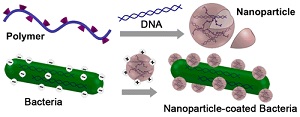 |
| Illustration of nanoparticle-coated bacteria--Courtesy of Zhejiang/Nanyang |
Cancer vaccines are designed to spur the immune response into action against cancer cells in the body. But getting this type of immunotherapy to work in an oral treatment is tricky, as the stomach and the gut are difficult places for DNA to survive and eventually pass into the bloodstream intact. To this end, researchers in Singapore and China have developed nanoparticle-coated bacteria that can someday be used to create effective DNA vaccines, as published in a paper in the journal Nano Letters.
According to a report from MedicalXPress, researchers Yuan Ping at Nanyang Technological University and Guping Tang at Zhejiang University in Hangzhou found that there were two major hurdles to delivering an oral cancer vaccine: the normal immune response, which inhibits the bacteria, and the acidic environment of the stomach and intestines.
But bacteria coated with nanoparticles are much more likely to make it past these roadblocks and instigate a viable immune response. The coating both protects the each bacterium by creating a physical buffer and, due to its high number of protons, can render white blood cells less harmful to it.
"Immunotherapeutic agents have provided limited evidence of clinical success until recent advances in understanding how cancer cells escape recognition and attack by the immune system," Ping told MedicalXPress. "This offers many opportunities for scientists to rationally design vaccines which can accomplish cancer immunotherapy. Because bacterial coatings can be simply achieved by the self-assembly between bacteria and nanoparticles, we expect that this type of vaccine can be used as traditional 'drug in the vial' type formulations for patients in clinical settings in the next 3-5 years."
- here's the abstract
- and here's the report from MedicalXPress